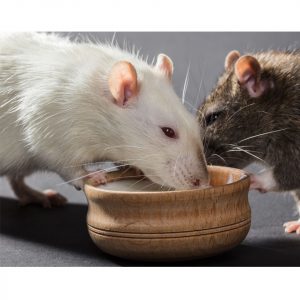Rats are incredibly famous for eating cheese. But can, and more importantly, should they eat cheese and other dairies?
Pet rats are generally lactose intolerant. However, it can be an occasional treat if they react positively to dairy.
Dairy products are still very fatty, so it’s not a treat that should be given too frequently since it can cause health problems to your rat if fed in large quantities.
There are many different dairy products and healthier alternatives to provide your pet rat in moderation.
So what dairy can and can’t your pet rat eat?
| Colby Cheese | Yes |
| Cheddar Cheese | Yes |
| Gouda Cheese | Yes |
| Edam Cheese | Yes |
| Emmental Cheese | Yes |
| Mozzarella Cheese | No |
| Ricotta Cheese | No |
| Gorgonzola Cheese | No |
| Cottage Cheese | No |
| Brie Cheese | No |
| Feta Cheese | No |
| Cream Cheese | No |
| Blue Cheese | No |
| Cow Milk | Yes |
| Goat Milk | Yes |
| Lactose-Free Milk | Yes |
| Almond Milk | Yes |
| Oat Milk | Yes |
| Soy Milk | Yes |
| Plain Yogurt | Yes |
| Flavored Yogurt | No |
| Sugar-Free Yogurt | Yes |
| Greek Yogurt | Yes |
| Low Fat Yogurt | Yes |
| Soy Yogurt | Yes |
| Lactose-Free Yogurt | Yes |
Again, for all those Yes’s on the table, be sure to give them to pet rats very occasionally! And keep an eye out for your pet rat, in case they’re lactose intolerant.
Types Of Cheese Pet Rats Can Eat
| Colby Cheese | Yes |
| Cheddar Cheese | Yes |
| Gouda Cheese | Yes |
| Edam Cheese | Yes |
| Emmental Cheese | Yes |
| Mozzarella Cheese | No |
| Ricotta Cheese | No |
| Gorgonzola Cheese | No |
| Cottage Cheese | No |
| Brie Cheese | No |
| Feta Cheese | No |
| Cream Cheese | No |
| Blue Cheese | No |
Pet rats, just like many other animals, are generally lactose intolerant. This means they can’t efficiently digest most dairy, like cheese.
However, this all depends on the rat. Some pet rats won’t have any trouble when ingesting dairy.
In contrast, others will experience an upset tummy and runny feces.
There’s even the case where pet rats will get used to dairy.
In fact, a lot of treats you can give your pet rat might result in runny feces the first time they ingest it since their systems are dealing with that specific food for the first time.
It’s the same with us. We have different ways of coping with certain foods; as babies, our bodies will react poorly the first time we eat a particular food.
With that said, there are many types of cheese, and some are lactose-free. It all depends on the way they’re processed.
Cheese that tends to be harder or drier is the best option to give your pet rat. These include Colby, Cheddar, Gouda, Edam, and Emmental cheese.
Generally speaking, if you tend to have cheese slices at home, you can share bits of these with your pet rats. It’s one of those rare treats, say once a month.
These are also usually less fatty, so even though it’s something it should be given sparingly, they’re healthier than other cheeses.
Mozzarella, Ricotta, Gorgonzola, Cottage, Brie, Feta, and Cream Cheeses are examples of cheese you shouldn’t give your pet rat.
They’re very fatty and salty, so even in low quantities, it’s something that could affect your pet rat’s health. So even though you have them at home, avoid giving them to your pet rat.
Instead, be sure to have some Edam or Gouda at home as a special treat. This kind of cheese takes a long time to go bad, so you can keep it in the fridge.
Another cheese that is a big no for pet rats is Blue Cheese. It’s extremely salty, and the mold is hazardous for your pet rat.
Generally speaking, if you tend to have cheese slices at home, you can share bits of these with your pet rats. It’s one of those rare treats, say once a month.
But, to be on the safe side, it’s good to always look up the type of cheese you have at home so you’re sure it’s safe to give them to your pet rats.
Also, if you notice a significant difference in their droppings after eating the cheese, keep an eye on them.
If you see softer feces every time your pet rat eats cheese, change the treat to something else with no dairy!
A good option for pet rats is, surprisingly, baby food! Here’s what you need to know about baby food for pet rats.
Types Of Milk Pet Rats Can Take
| Cow Milk | Yes |
| Goat Milk | Yes |
| Lactose-Free Milk | Yes |
| Almond Milk | Yes |
| Oat Milk | Yes |
| Soy Milk | Yes |
Like with cheese, milk is a treat that should be given occasionally. Again, if your pet rats can’t efficiently digest dairy, you should avoid giving them milk.
However, there are many milk alternatives! Goat milk, for example, is lower in lactose, sugars, and even fat. This makes it a healthier option.
When baby pet rats show slower growth, feeding them some milk is very common to help them grow stronger and healthier.
However, this should be discussed with a veterinary since they can better guide you on what kind of milk to give or even other alternatives such as supplements and vitamins!
Even if they can drink it, milk is still something with too much sugar and fat, so you shouldn’t give it to your pet rats every other day.
Nowadays, there are also many milk alternatives, such as lactose-free milk or even plant-based milk!
Soy and almond milk, for example, is a much healthier alternative to give your pet rats, and they’ll also find it delicious. Maybe more so than regular milk!
Be sure to find plant-based milk with 0% added sugars, which is even healthier. Still, this should be given every so often since they still have many calories.
Plant-based milk is usually made of nuts or seeds rich in protein.

Even if they are something good for a pet rat’s diet, too much protein and calories result in an overweight pet rat.
Don’t forget that pet rats will eat anything that is put in front of them. They don’t know what is good and what isn’t, and as long as it exists, they’ll keep consuming it.
It’s up to you to be responsible and control their diet. None of these foods should replace their usual food.
These are just something extra for them to enjoy from time to time. Just like we treat ourselves to certain foods sometimes!
So, you should feed them daily with dry food, explicitly mixed for pet rats. The Oxbow Essentials is an excellent choice, for example.
Then every few days, it’s good to feed them some veggies along with the dry food and an extra delicious treat once every week!
If you wish to learn more about feeding your pet rats, you can click here to learn How Much And How Often Should You Feed Your Pet Rats.
Types Of Yogurt Your Pet Rat Can Eat
| Plain Yogurt | Yes |
| Flavored Yogurt | No |
| Sugar-Free Yogurt | Yes |
| Greek Yogurt | Yes |
| Low Fat Yogurt | Yes |
| Soy Yogurt | Yes |
| Lactose-Free Yogurt | Yes |
Yogurt, just like milk, should be given sparingly. It’s good to find yogurt low in fat and sugar, for example, so it’s healthier for your pet rat.
So, plain yogurt or low-fat greek yogurt are the best choices.
I’ve written a more detailed guide on how much yogurt rats can have right here.
It’s also a good idea to avoid anything with added flavors, such as strawberry or banana yogurt. These usually have an insane amount of sugar, and other additives have been added to the yogurt.
Instead, you can add fresh fruit to the yogurt. Apples, pears, bananas, and berries are delicious additions to your pet rats’ special yogurt treat!
Again, you can now find many alternatives, such as lactose-free or plant-based yogurt. These are not only healthier but also tastier.
So, if you have the opportunity, give them plant-based yogurt instead of those with lactose.
As we’ve already seen, many pet rats can adapt to dairy and lactose. However, some will never be able to easily digest it.
If you give them a lactose-free alternative, there’s no need to worry about whether your pet rat can digest it!
Finally, yogurt can be an excellent treat for your pet rats during warm summer days. You can make tiny drops of yogurt and keep them in the freezer.
Whenever you want to give your pet rats a special treat to help with the heat, offer a yogurt drop to each of them, they’ll love it!
It’s even possible to buy yogurt drops, specifically for pet rats and other rodents, like the ones from Vitakraft.
If you want to know more about yogurt and how to make your own drops or even learn, click here to read our post on Yogurt For Pet Rats.
What Happens If Pet Rats Drink Milk?
As we’ve mentioned before, pet rats are generally lactose intolerant. This means that their bodies cannot easily digest dairy products.
For that reason, most of the time, when a pet rat first consumes any kind of dairy product that contains lactose, they will show signs of an upset tummy.
You might notice that their droppings will have a different consistency and even become smelly.
Not only that, but your pet rat might not eat as well as the other days.
However, there is nothing you can do but wait for their bodies to get back to normal. Feed them as you usually do, and be sure your pet rats always have water available.
Note that this might not happen with all your pet rats. Some might be more sensitive to certain foods, such as dairy, than others. It is possible for your pet rat’s body to adapt to dairy!

Since a pet rat’s body is not made to ingest dairy, it’s always best to pick lactose-free alternatives, so your rodent friends can enjoy their treats.
As we’ve seen throughout this article, there are many safe alternatives you can give your pet rat, so try different things and see what they prefer.
How Much Dairy Should I Give My Pet Rat And How Often?
Even if you’re giving your pet rats lactose-free dairy products, it’s important to remember that most of these have great quantities of fat and sugar.
These things will easily make your rodent friends overweight, which can bring other problems to their health.
For that reason, it should be given sparingly.
If you intend on providing a tiny quantity of milk, cheese, or yogurt to your pet rats once in a while, you can make it a special treat once every week.
If you don’t notice any change in how they digest it or their weight stays the same, you’re giving them just enough of a special treat.
On the other hand, if you prefer to play safe, you can give it to them only once a month.
Give them other more healthy treats weekly, such as nuts, seeds, fruit, veggies, or even bits of cooked egg, and keep extra savory treats for a particular day of the month.
For example, you can give them a small piece of cheese or yogurt to celebrate the day you brought them home.
This way, you’ll never forget such a special day, and neither will them!
You might also like to read this article on what Human Food pet rats can eat!




